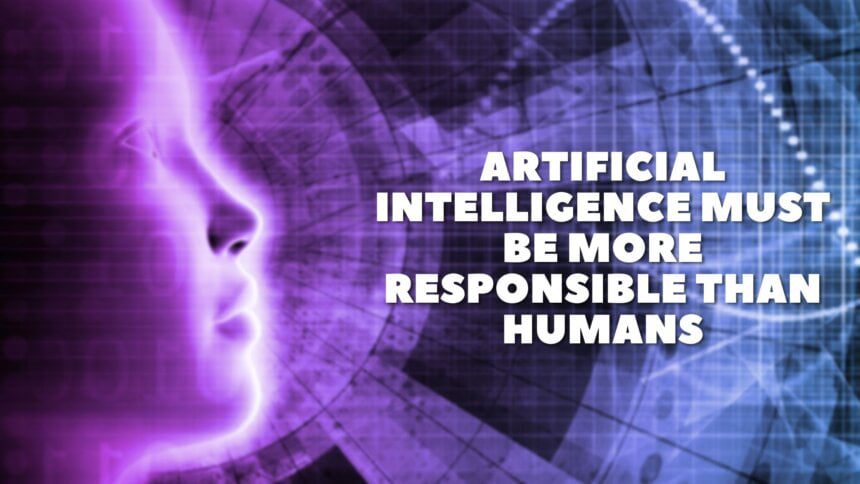Ethics of Artificial Intelligence
the dawn of Imperial age cultures over 5000 decades back, people have been producing social governance standards. The procedure continues with lots of flaws, and the ethics of artificial intelligence is feeding human data. That includes their observable decision and logical thinking. AI uses the data point and gives results to improve daily life. The decision can be better, and it can eliminate all the emotional reflection. The processes are more inputs to get the results. It collects human data. Thus, it can give results of a similar standard. It usually replicates human behaviour. Principles that regulate the conduct of accountable AI systems establish.
Among those topics that require more conversation is”obligation.” As humans decide on the cumulative data, they experience it. Thus, artificial intelligence ethics also decides on cumulative data. That can enhance the process for better results. As it results, AI’s decision can be more accurate from the previous results. It can keep on improving. Who or what’s responsible for its benefits and harms of using this tech? It might happen due to the wrong choice; in that particular case, who will be accountable? To handle, it appropriates from its domain of policy and technology. Its effects are very drastic.
It practically wrongs to think as a theory of practice. As a solution, it may require a more real-life experience. It is also relevant to ethics (other) automation technologies like robotics even though there are a few particular problems to an AI.
It’s supposed that only people can be accountable reps. It can raise many problems which present from the beginning of the two theorists. It states for the obligation. The next well knows the question for this is of several hands “several things.” It is also known as the temporal dimension highlights. But it has to do with the control state.
It has to give specific attention to the matter of transparency. That is difficult to explain its abilities. As per the journals, it considers as the issue regarding the symbol of obligation. It is related to the other facets of their authority terms. The sufferer’s duty might require reasons for decisions. The actions have made by explaining their skill. This decision is affected by the hierarchical strategy, obligation as proving its skill. It provides a critical and primary reason. That is for defining the gift stated by the bureau.
AI allows society to automate tasks and enhance it to a more significant extent than previously. Who or what’s responsible for its benefits and harms of using this tech? And in that case, the issue can be handled by the domain of policy and technology. So, what exactly does the growth of responsibility holding the ethics of artificial intelligence imply?
The issue of agreeable attributes to the approach initiates the adaptation between two Aristotelian states of obligation. First is all about control and a need to recognize the accountable agent. The second assesses the broker’s knowledge. It’s supposed that, even though AI technology gains more service, people stay responsible. Since the end could be accountable, AI technology may have agency but don’t meet moral agency standards and moral duty.
There are some principles cited under that can elaborate more about AI, and it is duty:
Honest
All AI systems ought to be honest in handling people and being more inclusive in the policy. They need to not demonstrate any prejudice in functioning. In the past, people have employed at least two significant standards for unjust treatment, i.e., sex and caste/race/ethnicity.
Transparent and Accountable
As we all know, AI & ML calculate their data, and the accountable for its results change with instructions. That makes them transparent and this “Black box” character of AI, which makes it rather hard to obtain the origin of error in an erroneous forecast. This effects in making it hard to pinpoint liability. Neural networks will be the underlying technology for several faces, voice, and charm, etc. recognition methods. It’s more challenging to trace neural network issues, especially heavy ones (with several layers).
Dependable and secure
Safety and depending on all AI systems have particular strange dimensions, e.g., unpredictability. Facebook, in cooperation with the Georgia Institute of Technology, created robots that may negotiate, but they learned how to lie. The following matter is the slow growth of Artificial General Intelligence (AGI). It can produce systems that mimic human reasoning and generalize across the various scenario.
As AI-driven roles are responsible for evolving its processes, it will keep on learning to be self-sufficient. AI will increase the circumstance where a system can function, which is not possible to determine.
Unpredictability reduces the reliability and security of the systems.
Problem resources
Models and attributes
The AI in usage today can be Narrow AI also; it won’t operate if the context varies. A system built to inspect medical insurance coverage can discriminate against people with ailments if used to vet software for auto insurance. The characteristics and weights aren’t suitable for the latter instance. Hence versions of attributes framed without equity in your mind can cause biases.
Data
The largest source of biases from AI systems is information as biases might be inherent in the report, either blatantly or subconsciously. It can also happen as the data was incorrect order or irrelevant. In credit risk, holding the artificial intelligence, consumers who whined less have been encouraged by taxation advantages. That will provide erroneous results when used for situations where tax advantages aren’t there.
MIT researchers discovered that facial investigation technologies had greater error levels for minorities, mostly minority women, possibly due to unrepresentative training information. The main reason for Amazon recruiting applications’ failure was many training processes on ten decades of details at which male applicants’ resumes outnumbered them. Additionally, it focused on phrases.
Communicate, describe the reasons for what they’re doing. The task is to serve human and nonhuman ethical patients. This scenario includes the duty to spread awareness of the importance of AI. It is to increase awareness of unintended effects. Also, the moral significance of what they do. Such as how they cope with awful issues. If AI isn’t likely to be more liable in such a sense, it will crash.
Other Troubles
The growth of AI introduces further challenges not seen in conventional systems.
Driverless Vehicles
Soon, in future AI-driven roles will be responsible for driverless vehicles. These driverless vehicles will begin plying on the streets in a decade or so. Any crash will increase the issue of criminal and civil duty.
Prospective might accused automobile producers. This accusation also includes automobile proprietors or even the authorities. The situation can also alter the underwriting versions. Drawback issues may come as firms permit performance decisions to become data-driven. Today, developers will seem to be the only accused.
Weapons
Nations, e.g., the US, Russia, Korea, etc. aim to utilize AI in firearms, e.g., drones or bots. Presently the machines don’t have feelings. That increases the concern if a sovereign machine moves on a killing spree. In 2018, Google needed to prevent US authorities’ participant. The authority involvement was over its Maven army program. It is due to public outcry.
Safeguards
Guidelines
The worries are all over integrity. AI has led to several businesses. That is to formulate guidelines regulating the usage of AI. For example, the European Commission has “Ethics Strategies. It’s for Trustworthy Artificial Intelligence. ” US authority’s” Roadway for AI Policy,” IEEE’s P7000 standards jobs, etc. These include the fundamentals of integrity. It also provides loyalty which AI systems must follow.
Software
Several businesses have established frameworks, applications & guidelines that can help create Responsible AI, such as:
- IBM
- Microsoft
- PWC
- Amazon
- Pega
- Arthur
- H2O
And much more.
Firms
In firms, Responsible AI can ease by imposing criteria. That is through managing groups, and it will be producing diversity in groups. That will devote the message to people. There ought to be conscious attempts to reduce biases in data.
Prospective
In the subsequent two years, machines will become more autonomous. It will be fluent in decision-making procedures. The person will gradually cede control of their lives. The formation of Responsible AI will decrease biases and human errors in the upcoming time. It will help to boost the approval of AI. This process will aid in developing a fairer and open society. An abrupt development of AI won’t just make people less conducive to AI but one another. This AI will be more accountable for its result day by day.
This scenario is a brief of some issues concerning power for AI. It is focusing on influenced attribution that can solve problems concerned with AI power. It also focuses on obligation because of authority. We moved out of a typical discussion about the knowledge that controls from moral agents. It utilizes and creates AI into a more relational perspective that can change everyday human life. This change will consider the moral agents’ level of awareness. It will control of their activities’ unintended and ethical importance. For example, AI will affect honest patients. People might require and deserve a response. It can be regarding what can do to them and determined about them through AI.
AI is currently permeating our everyday lives that evolutes our technology more and more. All people are ethical patients. They discussed in this particular discussion. In the event, the conceptual framework provided here is sensible. Moral patients have information about demanding AI engineering. Societal arrangements empower successful attribution. It also allows distribution of obligation. That requires applicable agents. It helps to work out their duty when developing and using AI.
Employing the relational frame presented this need. That is to exercise duty for society. That arouses AI pros and operators accountable. Understand what they’re doing, and are capable and ready to produce.





